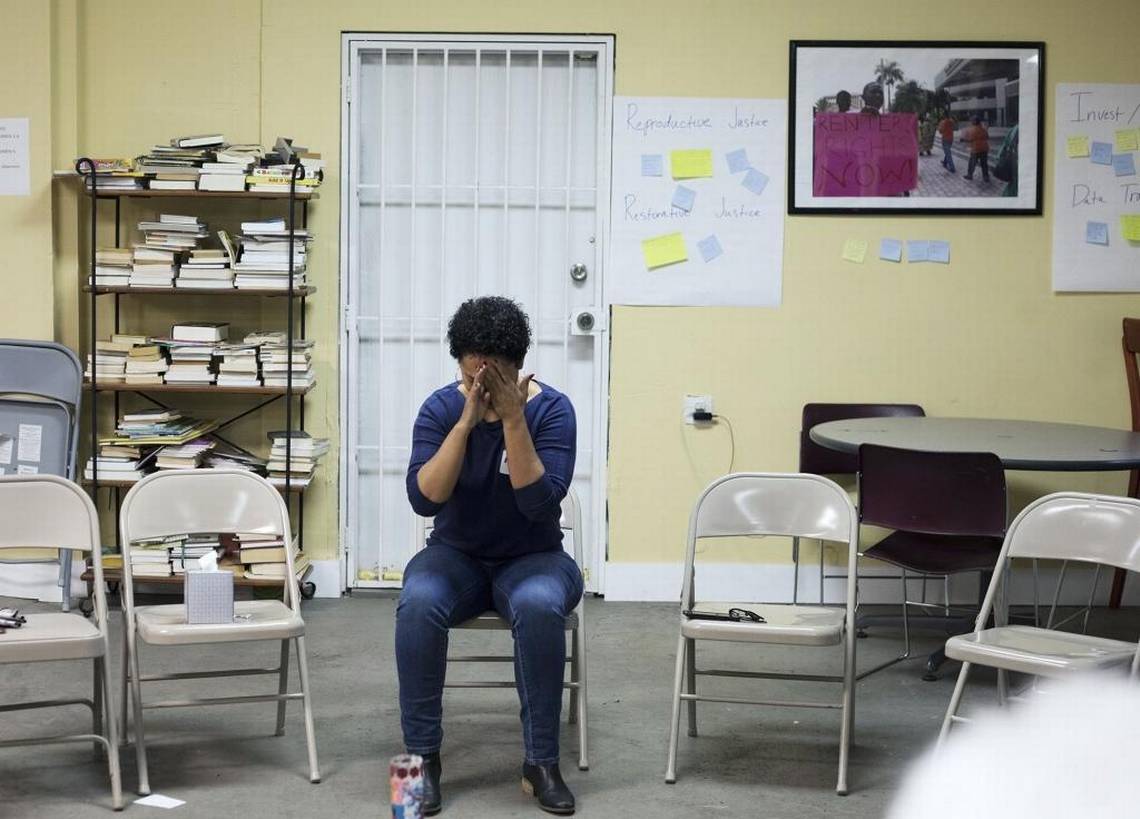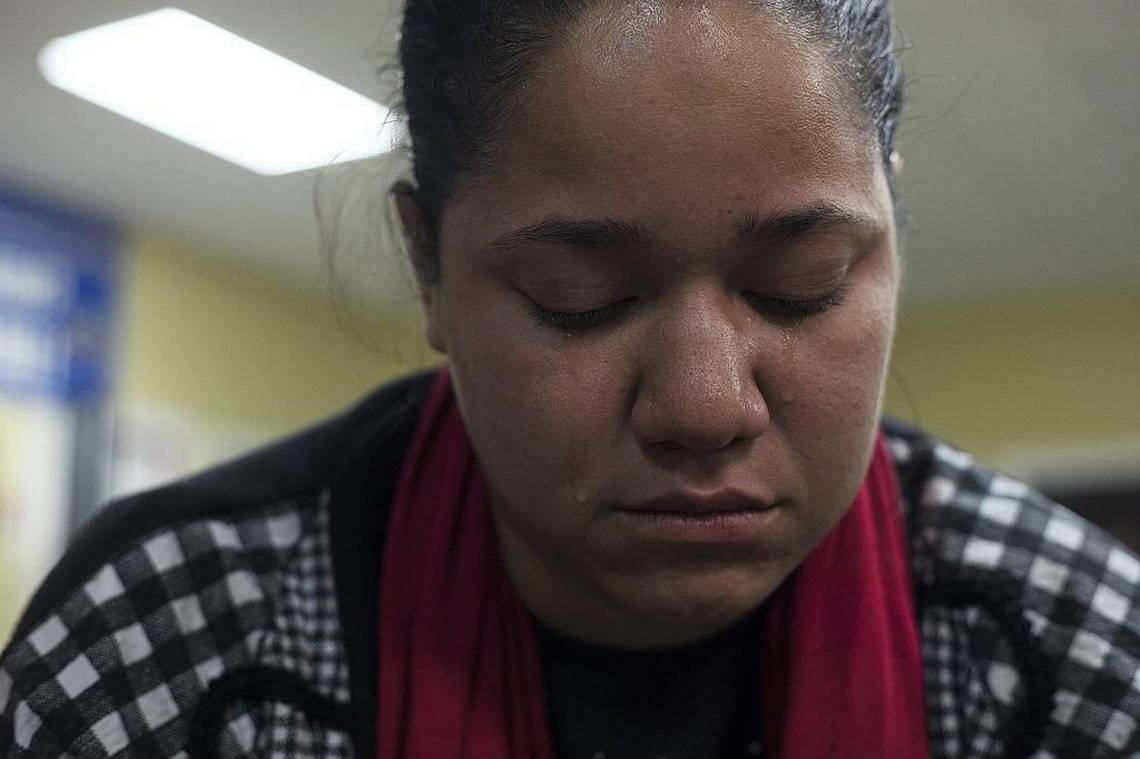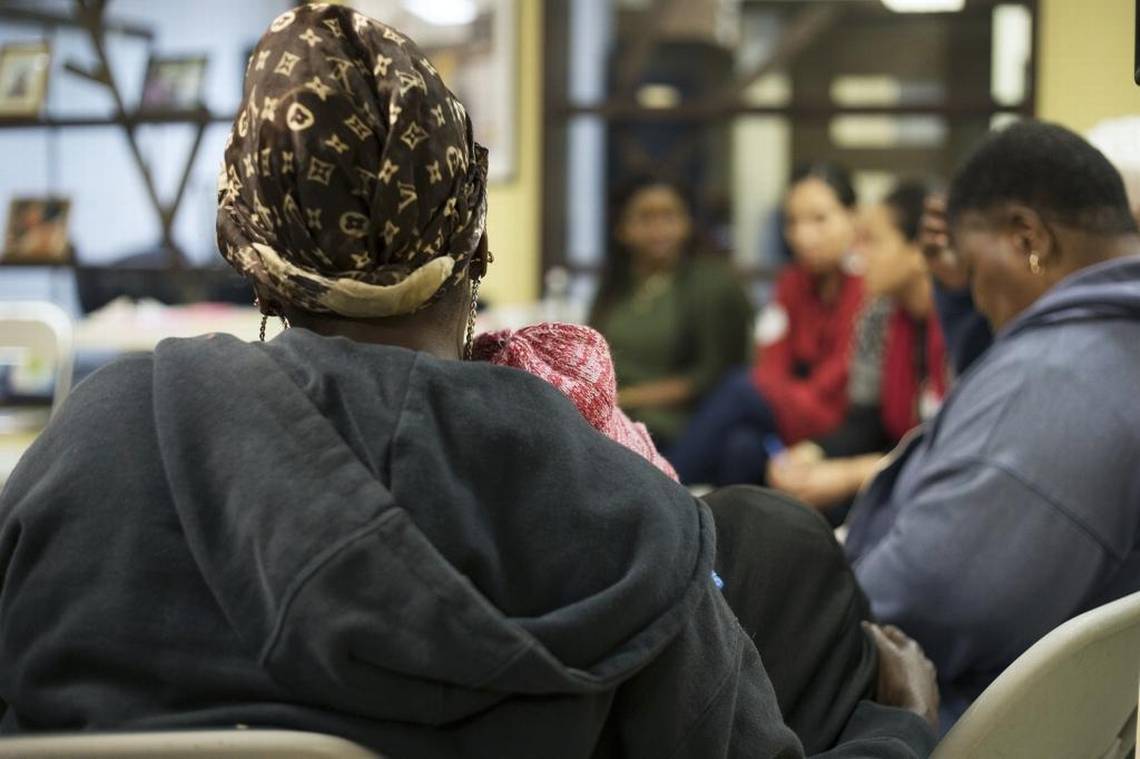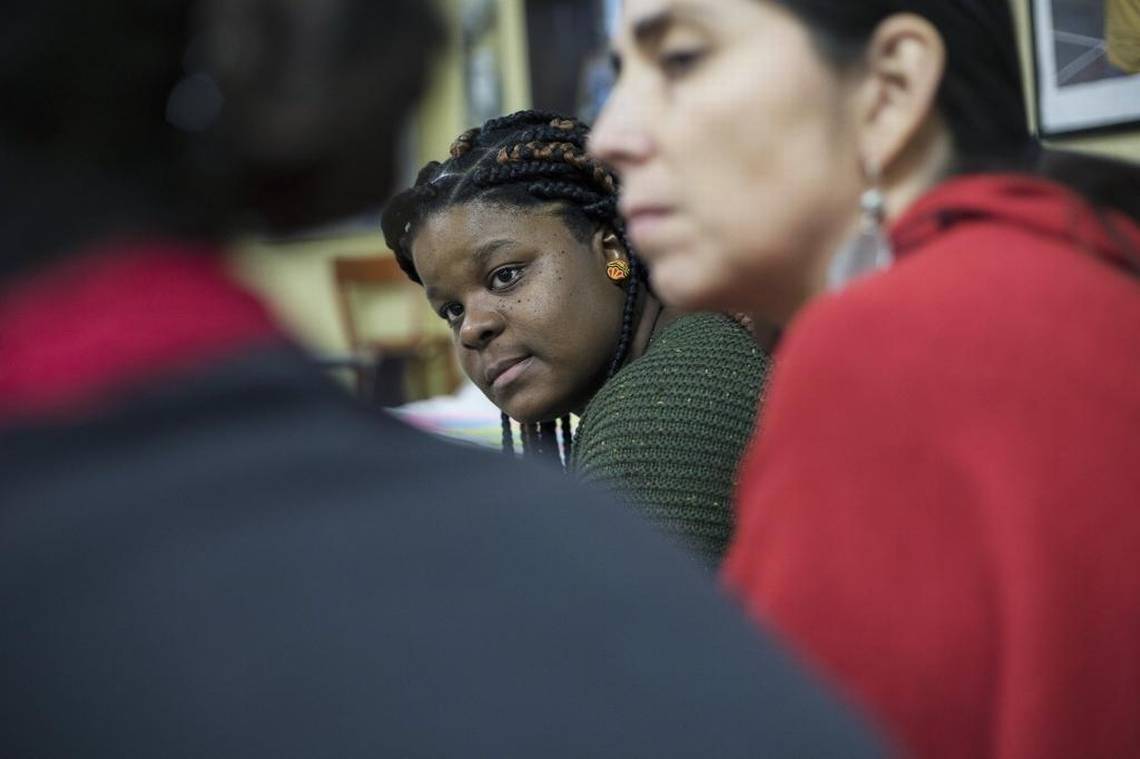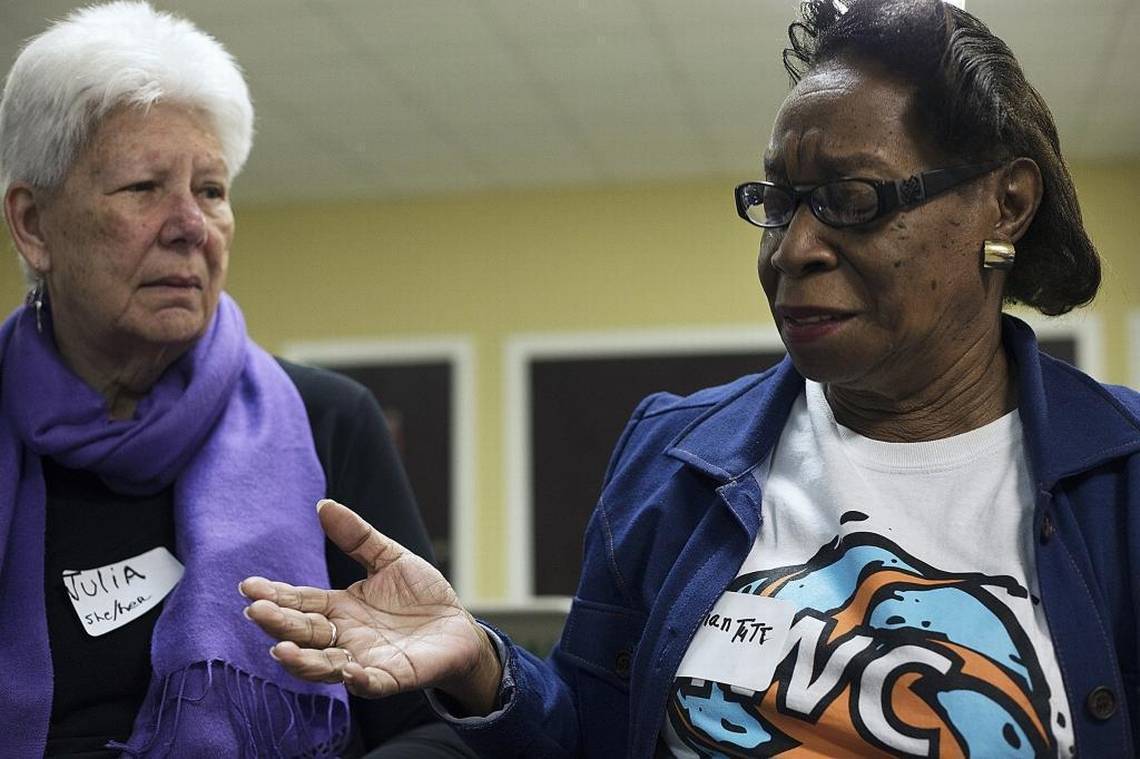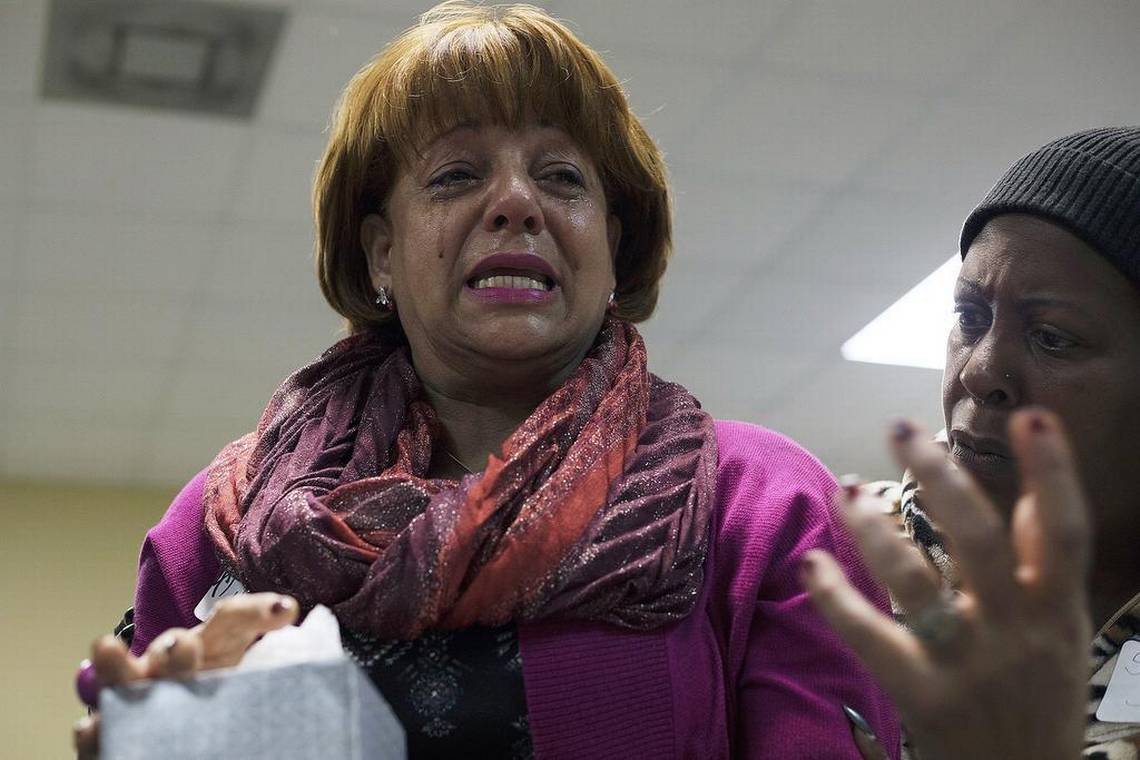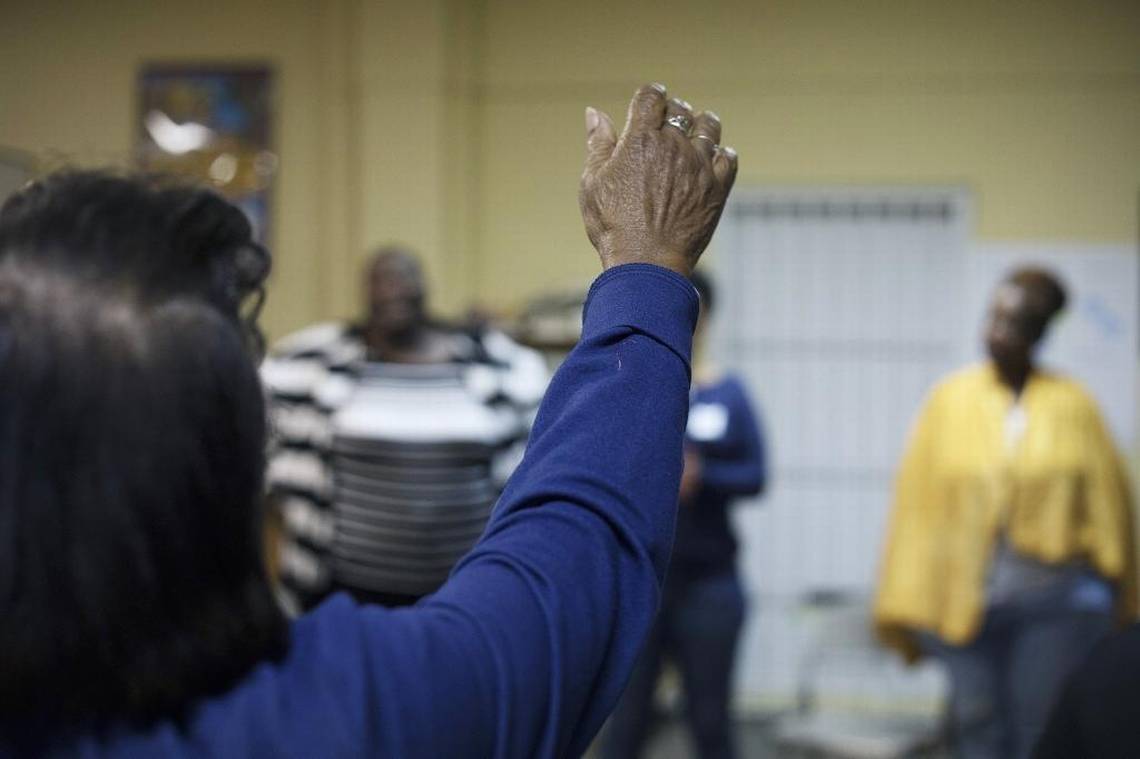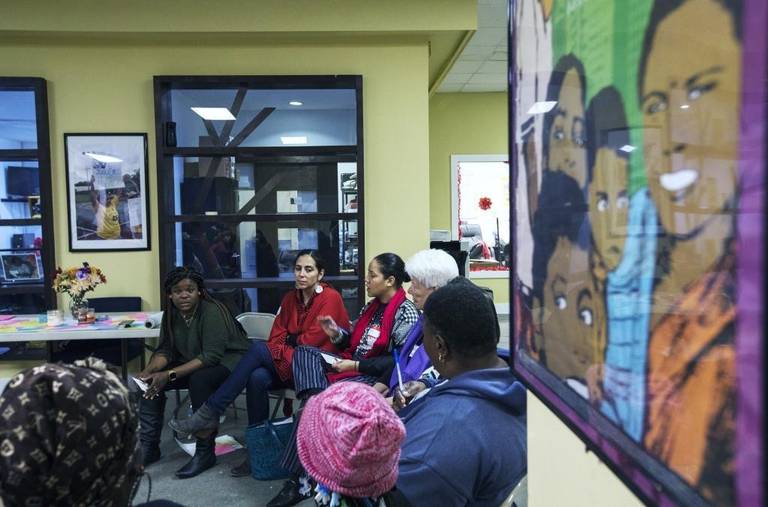#metoo Campaign Triggers Horrid Memories for Miami Women
By Brenda Medina
“How many folks in this circle have been sexually harassed?” Jasmen Rogers, moderator of the Women’s Circle, asked during a recent Tuesday meeting. Fourteen of the 16 women raised their hands. “How many folks in this circle have been sexually assaulted? Answer only if you feel comfortable sharing that information,” Rogers continued. This time, 10 women raised their hands. “How many folks in this circle have felt safe to report it immediately?” Only one person raised her hand. The discussion, organized by the nonprofit Miami Workers Center, flowed across several generations. The oldest participant was 79. The youngest was an 8-year-old girl who accompanied her mother.
Too young for such a gathering? Perhaps. But out of the 10 women who said they were victims of rape, six said they were abused before they were 8 years old. Reports by the Centers for Disease Control and Prevention indicate that nearly one out of five women have been raped at some point in their lives. The number is even higher within some minority groups, according to the CDC. Some of the participants asked not be identified by their full names. ‘It is hard to grow up in our bodies’ Before she turned 12, Sonya already had wide hips. “I am a black woman. This is how we are,” said Sonya, who grew up in a working-class Miami neighborhood. “But it is hard to grow up in our bodies. “I always walked to school. And ever since I started developing my breasts some men looked at me like I was a piece of meat. They pulled down their zippers and showed me their stuff. They yelled at me from cars. “I started thinking that I was doing something wrong, that something in me was not right. “I stopped eating. I became a size 1. I used baggy clothes. My mother noticed it, too, because I no longer went out to play on the front yard. “Today, when I see my daughter, who is the same age I was then, cross her arms in front of her chest because her breasts are developing, I always go and gently pull her arms away. “I make sure to tell her that there’s nothing wrong with her body.” But Sonya remains afraid for her daughter. “What will she have to deal with when she grows up?” she said. As the women become more open with each other, the tales become more sordid — with episodes of incest and emotional violence. ‘I don’t remember my childhood’ Yuleidy Gonzalez-Nieto, 27, is from Cartagena, Colombia. She moved to Miami with her parents and brother when she was 10. Even then, she already was a survivor. For years, she avoided talking about what had happened to her — until that Tuesday night at the Women’s Circle. “I don’t even remember how old I was, that’s how young I was when the abuse started,” said Gonzalez-Nieto, who was raped several times in Colombia. “The only thing I remember is that it ended when we moved to Miami.”
As she spoke, another participant, the mother of the 8-year-old girl, instinctively put an arm around her daughter’s shoulder and pulled her closer. “I don’t remember my childhood,” Gonzalez-Nieto continued. “It’s strange, how the brain works, but to block out those memories, I wound up blocking almost everything. You know, when people say, ‘When I was 8 years old, when I was 9,’ … I don’t remember any of that.” On the other side of the circle, Marcia Olivo, director of the Miami Workers Center, nodded. “It’s very interesting that you say that,” said Olivo, who was sexually abused by an uncle when she was a young girl in the Dominican Republic. “I also feel that I don’t remember parts of my childhood during the years that the abuse was going on. Many things were erased from my memory.” ‘Let’s play doctor’ Jasmeen Rogers said she started to recall odd events after listening to and reading many of the #MeToo testimonies. “I can remember a very, very specific memory from my childhood, when my dad took me to a church member’s house and there was this youth there,” she said. While her father was talking to the church member, Rogers played with the boy.
“I remember him being significantly older than me; we probably shouldn’t have even been playing together. And I can remember being under a table with him, playing with my toys. And I remember him saying, ‘Let’s play doctor.’ And then, that’s when the memory stops. “I have no recollection of what happens next. And that memory only reemerged after being in community with so many women that were sharing their stories. And I hear things very similar to the beginning of that story, but I don’t know … I can’t force the memory forward of what happened next. “Nothing could have happened next, or everything could have happened next. But it’s interesting to me that I can now remember up until that point, up until he says, ‘Let’s play doctor,’ knowing how that story ended for so many other women.” ‘My brother did it’ Unlike Rogers, Vivian Tutt has a clear recollection of her abuser, even though it’s been nearly seven decades. “From the age of 7, I was physically raped by my brother. He was older than I was,” said the 79-year-old Tutt. It’s only the third time that she’s ever talked about it.
“My siblings and I shared one room. It was me and my sister sleeping in one bed and him and my other brother slept in the other bed. For the first year I was really confused, but as it happened over and over again I would put myself in another world. “What is going on down here is what’s going on down here,” she said, using her arms to illustrate what she meant. “But up here I was gone to different places in my head, so that it wouldn’t bother me. “When I was 10 years old he tried to put it in the front of me and I screamed with pain. When I screamed, my mother came in the room and he told her that I was having a nightmare. “He would say, ‘If you tell my mom, it could kill her. And if you tell somebody else, I am going to kill you and I will kill them.’ When he said he would kill me, my thought was, ‘Do it! That way I won’t have to deal with what you are doing to me.’ “But one day, when I was about to turn 11, we were in the room and he was having this affair with me. My cousin came down the stairs and she saw him. That was one of the most blessed days of my life. She grabbed him and she threw him on the floor. And she began to beat him. As she beat him, my sister upstairs heard it and she came down and then we all just beat him up. “I am so glad that my cousin loved me so much.” ‘I am the fruit of a rape’ For some women, sexual abuse can mark life before it even begins. Milagros Jimenez, 51, began her story with an analogy so pretty that at first, it was difficult to connect it with the cycle of violence.
“It’s like a flower that sprouts another flower, and that flower sprouts another flower,” Jimenez said while opening and closing her left hand, as though blooming flowers were spreading. “I am the fruit of a rape,” she said as the circle fell silent. “And I was also raped.” “My mother was a maid in the Dominican Republic. My father was the owner of the house where she worked. He abused my mother and I was born from that. “I think of how much my mother suffered during that time. These days, those stories stir everything inside of me.” Jimenez comes from a poor family that lived in the countryside. When her mother went to work, a neighbor would come to her house and lock her in a room. “I was 4, 5, 6 years old. He rubbed his genitals on me. He did not penetrate me, but he used my pelvis. It went on for five years, and I did not dare to tell my mother because he told me that he would kill her if I told her that he made me happy.” “That’s what he would say to me. ‘Come, I am going to make you happy,’ ” she added. “I felt dirty. I was disgusted. I could not stand any men. I ran from them.” Jimenez immigrated to the United States, where she has always worked cleaning hotels and homes. As an adult, she has fought off sexual abuse attempts “with tooth and nail.” One attack came from a hotel guest, another by the owner of a home she cleaned. “Just because you defend yourself doesn't mean that the abuses stop,” she said. “There's always someone else who tries.” "The women of today and tomorrow’ Before ending the session of the Women's Circle, Olivo offered some guidance. “What you heard today will probably trigger some bad memories. You will feel frustrated, you will have nightmares,” she warned. “You have to remember that none of this is your fault. Drink a lot of water and try to sleep well.”
“But it’s good. It’s a good thing to talk about it. You will see that you will feel better because you spoke out,” said Tutt, the eldest lady in the group. “It’s like a burden that’s lifted off your shoulders. It’s a way of starting to heal, of starting to change things. I never imagined we were so many. We are the women of today and tomorrow.” Before they left the gathering, Tutt led the group in a protest song: As the other women repeated each phrase in the chorus, their shouts echoed through the old warehouse. Then the 8-year-old girl who had fallen asleep on her mother’s lap began to wake up.
Brenda Medina: 305-376-4652, @BrendaMedinar
|
.
Any original material on these pages is copyright © BishopAccountability.org 2004. Reproduce freely with attribution.
